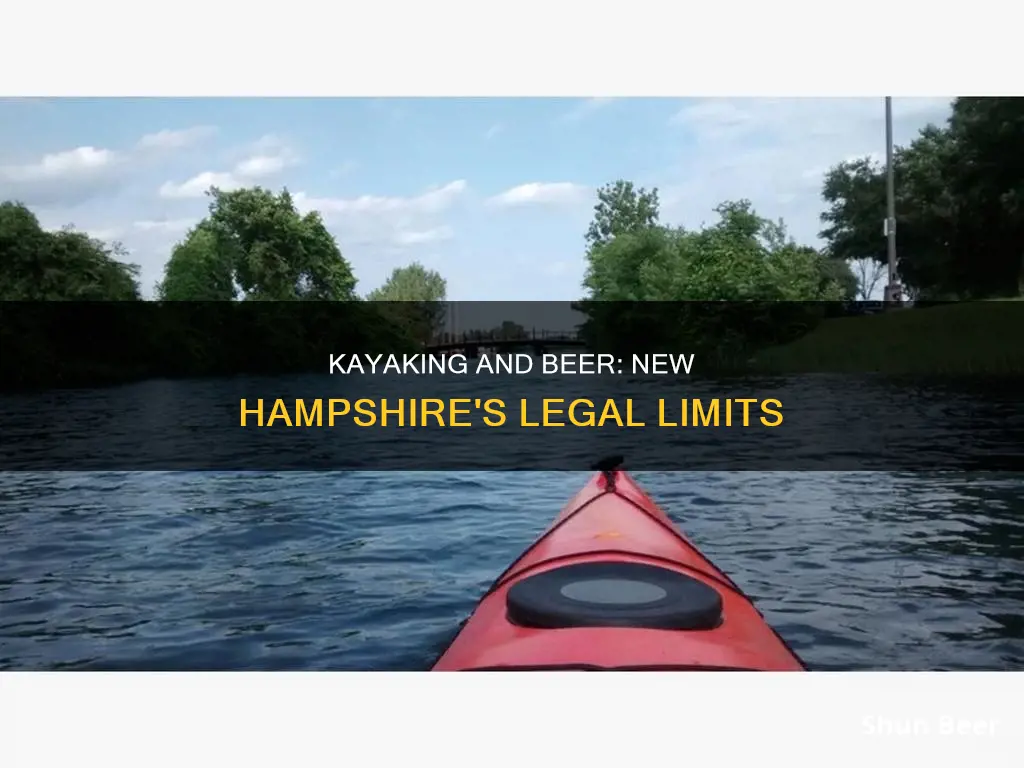
Drinking while kayaking is a popular topic of discussion, with some people arguing that it is a fun and enjoyable way to relax and others expressing concerns about the safety and legal risks involved. While there is no federal law prohibiting alcohol consumption on kayaks, local and state laws vary and it is important to be aware of the regulations in your area. In some states, such as Tennessee, it is legal for those 21 and older to drink on non-motorized watercrafts like kayaks and canoes, while other states have stricter restrictions. Understanding the legal and safety implications of drinking while kayaking is crucial to making informed decisions and ensuring a safe and enjoyable experience on the water.
What You'll Learn
- Drinking while kayaking in NH is dangerous due to dehydration, fatigue, hypothermia, poor coordination, slow reaction times, and heightened risk-taking
- Drinking in public is illegal in most NH towns, including on town beaches and in parks
- Drinking while kayaking is illegal in some states, such as North Carolina, but legal in others, like Tennessee
- The blood alcohol limit for operating a kayak is 0.08% in most states, including Tennessee
- Penalties for kayaking under the influence can include fines, jail time, loss of boating privileges, and impoundment of the kayak

Drinking while kayaking in NH is dangerous due to dehydration, fatigue, hypothermia, poor coordination, slow reaction times, and heightened risk-taking
Drinking while kayaking in New Hampshire is dangerous and ill-advised due to the heightened risks of dehydration, fatigue, hypothermia, poor coordination, slow reaction times, and heightened risk-taking.
The combination of wind, sun, and physical exertion while kayaking can lead to dehydration, which causes alcohol to have a more potent effect. This can impair your judgment and make you more susceptible to the sun's harmful effects, leading to dehydration and fatigue. Alcohol also impacts your body temperature regulation and perception, increasing the risk of hypothermia if you fall into cold water.
Additionally, alcohol consumption impairs your coordination, balance, and vision, making it more likely for you to fall into the water and potentially drown. It also slows down your reaction time, which is crucial when navigating a kayak and being aware of your surroundings, including natural obstacles and other boaters.
Alcohol can further lead to heightened risk-taking behavior, which, when combined with impaired judgment, can result in dangerous situations. It is important to recognize these risks and understand that drinking while kayaking can have severe consequences.
To ensure a safe and enjoyable experience, it is recommended to refrain from drinking alcohol while kayaking and to prioritize hydration by consuming water, lemonade, or electrolyte-replenishing drinks. By saving the alcohol consumption for shore, you can maintain your coordination, reaction time, and overall safety while kayaking in New Hampshire.
Post-Massage Beer: Is It Safe to Drink Alcohol?
You may want to see also

Drinking in public is illegal in most NH towns, including on town beaches and in parks
Drinking in public is illegal in most towns in New Hampshire, including on town beaches and in parks. While there is no law in New Hampshire that generally prohibits drinking in public, public intoxication is illegal. Local town and city governments can pass ordinances that restrict when and where people can drink in public.
Alcoholic beverages are prohibited on New Hampshire state beaches, and most towns have bylaws that make it illegal to drink in public, including on town beaches and in parks. The rules differ in some states, such as Oregon, where drinking is permitted on almost all public beaches. Many beaches in Florida and California also allow adults to consume alcoholic beverages, although they may ban glass containers or impose strict penalties for public intoxication or littering.
Those in favour of allowing alcohol consumption on public beaches in New Hampshire argue that adults should be able to responsibly enjoy a beer or glass of wine while on the beach. They believe that the potential problems associated with public drinking are already addressed by existing state laws or town ordinances, such as the ban on public intoxication or the hefty fines for littering.
On the other hand, opponents argue that allowing public drinking on the beach would make it less family-friendly and increase the likelihood of fights or noise issues. They also express concerns about the safety hazards that could result from adults leaving behind rusting cans or broken bottles.
Mixing Beer and Wine: What's the Harm?
You may want to see also

Drinking while kayaking is illegal in some states, such as North Carolina, but legal in others, like Tennessee
On the other hand, in Tennessee, it is legal for those 21 years or older to consume alcoholic beverages on non-motorized watercraft like kayaks and canoes. However, it is illegal to operate these watercraft while intoxicated, with the same BAC limit of 0.08% as driving a car. Tennessee has strict Boating Under the Influence (BUI) laws, and penalties for BUI can include fines, jail time, loss of boating privileges, and even impoundment of the watercraft.
While some states allow drinking while kayaking, it is important to note that alcohol and water activities can be a dangerous combination. Alcohol can lead to dehydration, fatigue, hypothermia, poor coordination, and slower reaction times, all of which can increase the risk of accidents and drowning. Additionally, drinking while kayaking may also result in legal consequences, as most states have BUI or BWI laws, and kayaks are often considered "vessels" under these laws.
Therefore, it is essential to know and follow the laws and regulations of the specific state you are kayaking in and to always drink responsibly and within the limits set by those laws.
The Magic Inside Beer Cartridges: How Do They Work?
You may want to see also

The blood alcohol limit for operating a kayak is 0.08% in most states, including Tennessee
Drinking alcohol while kayaking is a bad idea for several reasons. Firstly, it is illegal to operate a kayak while under the influence of alcohol in all US states. The blood alcohol limit for operating a kayak is 0.08% in most states, including Tennessee, which is the same as the limit for driving a car. This limit is enforced by the Coast Guard, which considers all kayaks to be "vessels" and therefore subject to the same rules as boats with respect to drinking and operating.
The consequences of drinking and kayaking can be severe, including fines, jail time, and the loss of a boating license. In addition, alcohol consumption increases the risk of accidents and fatalities while kayaking. Alcohol impairs judgment, balance, vision, and reaction time, all of which are crucial for safe kayaking. It can also lead to dehydration, fatigue, and hypothermia, further increasing the risk of accidents.
While the laws regarding drinking and kayaking may vary slightly from state to state, it is generally illegal to operate a kayak with a blood alcohol level above the legal limit. It is important to be aware of the specific laws and regulations in your state before consuming alcohol while kayaking. Even if kayaking on waters that are not patrolled, it is still a very bad idea to drink and kayak.
To stay safe and legal while kayaking, it is best to avoid drinking alcohol altogether. Instead, pack plenty of water and other non-alcoholic beverages to stay hydrated, especially if you are spending a full day on the water. Always wear a life jacket or personal flotation device (PFD) while kayaking, and be sure to plan your trip in advance, including a designated non-drinking kayaker if you are in a group. By following these guidelines, you can help ensure that your kayaking experience is both enjoyable and safe.
Marijuana and Beer: Mixing Effects and What You Should Know
You may want to see also

Penalties for kayaking under the influence can include fines, jail time, loss of boating privileges, and impoundment of the kayak
Drinking while kayaking can lead to a range of penalties, including fines, jail time, loss of boating privileges, and impoundment of the kayak. These penalties are designed to deter people from drinking and kayaking, as it can be dangerous and increase the risk of accidents and injuries.
In the state of Tennessee, for example, it is legal for those 21 years or older to consume alcoholic beverages on non-motorized watercraft such as kayaks and canoes. However, it is illegal to operate any watercraft while under the influence of drugs or alcohol. The blood alcohol limit for operating a kayak in Tennessee is the same as for driving a car, at 0.08%. If you are caught operating a kayak while intoxicated, you may face severe penalties, including fines, jail time, loss of boating privileges, and impoundment of your kayak.
Other states have similar laws and penalties regarding drinking and kayaking. In North Carolina, for instance, operating any water vessel under the influence of alcohol is against the law, and the blood alcohol limit is also 0.08%. While there may be some variation in the specific laws and penalties across different states, the general consensus is that drinking and kayaking is illegal and can result in a range of consequences.
The consequences of drinking and kayaking can be serious, and it is important to abide by the laws and regulations in your state. Penalties for kayaking under the influence are typically designed to deter people from engaging in this dangerous activity and can include a combination of fines, jail time, and loss of boating privileges. In some cases, your kayak may also be impounded by law enforcement.
It is worth noting that even if drinking and kayaking is legal in your state, it is not recommended. Alcohol can impair your judgment, coordination, and reaction time, increasing the risk of accidents and endangering yourself and others. It is always best to kayak sober and to enjoy any alcoholic beverages once you are back on dry land.
Beer Drinking: Healthy Habit or Health Hazard?
You may want to see also
Frequently asked questions
Drinking beer on a kayak is not explicitly illegal in New Hampshire. However, public intoxication is illegal, and operating a kayak while intoxicated can result in severe penalties.
It is illegal to operate any watercraft, including kayaks, while under the influence of drugs or alcohol in New Hampshire. The blood alcohol limit for operating a kayak is the same as for driving a car, typically 0.08%.
Penalties for kayaking under the influence (BUI) in New Hampshire can include fines, jail time, loss of boating privileges, and even impoundment of your kayak.
If you plan on drinking beer while kayaking in New Hampshire, it is important to do so responsibly. This includes designating a sober person to operate the kayak, wearing a life jacket, and staying hydrated with plenty of water and non-alcoholic beverages.
Alcoholic beverages are prohibited on New Hampshire state beaches, and most towns have bylaws that make it illegal to drink in public, including town beaches and parks. Therefore, it is essential to check local regulations before drinking on a kayak in New Hampshire.







